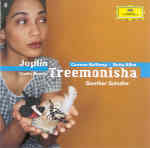For all his success as a composer of piano rags, Scott Joplin spent enormous time and effort trying to get his opera Treemonisha staged, to no avail. Fortunately, he published a complete piano/vocal score in 1911, upon which Gunther Schuller based his orchestrations for the Houston Grand Opera’s 1975 production. The production quickly led to DG’s premiere recording (the work’s only one to date), as well as a posthumously-awarded Pulitzer Prize for Joplin in 1976.
Treemonisha’s theatrical style embraces the operetta conventions of Lehar and Herbert, with lengthy recitatives characterizing Handelian opera and oratorio, and American popular idioms bridging the 19th and 20th centuries. There’s no denying Joplin’s awkward and naïve sense of theatrical continuity, yet the moral of his self-penned libretto, that education is a way out of poverty, still hits home. More importantly, Joplin’s genius for creating memorable melodies rarely flags, from the sublime (if somewhat out-of-character) barbershop quartet number “We Will Rest Awhile” to the uplifting choral finale “A Real Slow Drag”.
Despite close and cramped sonics, the recording generally wears well. Standout performances include Carmen Balthrop’s rich and focused soprano in the title role, Ben Harney’s vivacious word pointing as the villain Zodzetrick, and the young Willard White as Treemonisha’s father Ned. The great American mezzo Betty Allen brings passion and dignity to the role of Treemonisha’s mother, although her slow vibrato is hard to take. Schuller’s longtime advocacy of Joplin manifests itself in his energetic and heartfelt musical direction. DG’s original full-priced CD edition contained valuable essays and a libretto not included with this budget reissue. Notwithstanding its limitations, DG’s Treemonisha remains a major contribution to the Scott Joplin discography. [8/8/2005]
































